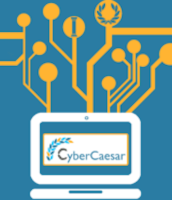
£25 (online course)
Classicists are more than generously served by the internet. You just have to mention Perseus, or The Latin Library, or The Suda…. one could go on. Try Googling ‘Latin Tutorials’ and you will find yourself neck high in offerings by enthusiasts, some good, some bad, and some, inevitably, downright ugly; but YouTube is buzzing with it, and lots of it is free. As in the old joke: the bad news is that the quality’s variable; the good news is that there’s tons of it. Then along comes C.’s CyberCaesar claiming, almost uniquely, as far as I can see, to be a free-standing course to the current requirements of GCSE. Further, C. says that he has ‘A’ level in preparation, and is mulling over the possibility of IB. You could reasonably argue that The Cambridge Latin Course represents the gold standard in online materials, developed with the help of a £5m government grant – but that’s all they are: materials in support of classroom or independent learner study, not a course.
So what do you get with CyberCaesar? It can be used in the classroom, mediated by a teacher (teacher support is provided in the course), or taken up by independent learners. It blends traditional and digital approaches, including English into Latin practice sentences from the start. There are three levels to GCSE: Basic (c. 50 hours study), Intermediate (both with emphasis on understanding and learning accidence, about 50 hours), and Further (40 hours), majoring on the syntax required for the examination. The styles of Basic and Intermediate are similar. Each Topic, covering basic accidence (cases, tenses etc.) to start with, is introduced by its connected Latin ‘narrative’. In this case we follow the life and times of a senator living in Herculaneum. The narrative presents new vocab and grammar (which are gathered cumulatively) and can be brought up on screen at any time.
Life and cultural issues are dealt with throughout the narrative, and later in English. There are lots of nice links available, too (e.g. a Mary Beard programme, and the chariot race from Ben Hur). Exercises follow, as many as you could want and more, using a whole battery of testing techniques, including digital flash cards and English to Latin translation. Feedback is given as you submit each example for machine marking (which C. calls ‘detailed, personalised feedback’).
Where appropriate there is an audio facility to teach and test. All scores are recorded and kept so the student and teacher can check on progress. Alongside the all-singing, all-dancing e-course itself, there’s an e-textbook with SCORM links into the course material. You can award yourself (or be awarded) badges, construct an ongoing journal of your progress (for reflective practice), approach the help forum or email C. himself.
Basic and Intermediate each consist of 12 topics. Within each topic there’s a number of items for learning, practising, testing and revising. For example, Topic 13 has 27 such items. There can be a range of activities within each item too. For example, one exercise item might contain a bank of a dozen tests.
The Further course has an accompanying pdf on subordinate clauses, two grammar reference texts, one specifically for GCSE, and a cumulative word list (there is no e-text book for this part). There are 11 topics, all more pared down than is the case with Basic and Intermediate, and focusing on need-to-know pedagogy.
Quality throughout the course is of the highest, and most will find it a pleasure to work through. It has been used for seven years at The City of London Freemen’s School, where C. is head of classics, and has shown an increase in take-up and exam results at the highest grades.
There are questions to be asked, though (which I have addressed to the author), e.g. the support available to students within the course – does it go far enough? Will the naïve learner need ongoing support that will nudge them, for instance, to take a break (concept density is a key issue in distance learning, and with hard-core Latin it is possible to have had enough fairly quickly)? Could C. video his lessons and archive them for repeated access? Grammatical meta-language is explained, but could this go further? I remember the terms ‘case’ and ‘decline’ being a cause of anxiety until my teacher explained them to me, and (as usual when you ask one, you get one free) also shed some light on the mental workings of the medieval grammatical mind. What do we do about set books? They could cause a problem for the (now less naïve) independent learner, but that will always be the case with self-study. Let’s just be thankful for e.g. the dedicated texts and commentaries produced by Bloomsbury and also look forward further guidance planned for CyberCaesar.
If I were still school-teaching I would get this in without hesitation, and without compromising my own teaching style and preferences. As for independent learners: it would be ideal for those who want to spruce up their Latin pretty quickly, though I would advise naïve independent learners to exploit the help channels for all their worth, and ideally find a mentor who might ease them through, no doubt brief, moments of anxiety. As a school teacher I would have to pay £900 for a licence for up to 200 students. As an independent learner I would get full access to the whole course for £25 per year. And as either I would think I had nabbed myself a bargain.
Sample it for yourself at https://cybercaesar.com/
Adrian Spooner
